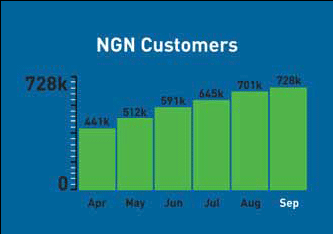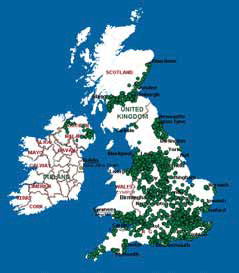
 |
Two years ago, Opal Telecom and its parent company, The Carphone Warehouse, changed the way residential broadband was sold in the UK. Together, they began offering free broadband to customers who switched their landlines and calls from BT to TalkTalk. In doing so, they sparked a furious price war among competitors, most of whom are still playing catch-up nearly two years later. TalkTalk’s proposition is made possible thanks to the fact that Opal operates the UKs largest fully unbundled network of local exchanges, delivering voice and IP services over a Next Generation Network (NGN) to around 70% of the UK. For the last six months, selected Channel partners have had the opportunity to migrate their customers to Opal’s NGN and take advantage of the cost savings delivered by full unbundling. Now Opal is opening up unbundled access to its Next Generation Network to the channel, and in so doing is bringing down operating costs for its partners and once again revolutionising the way the telecoms are bought and sold.
No-one can be in any doubt that convergence of voice and data traffic over IP-based Next Generation Networks is the future of the telecoms industry. The immediate benefits are lower operating costs for voice calls, and more opportunities for creating attractive broadband bundles. As the technology
matures, so advanced internet services – like video conferencing, IPTV, virtual office technology for home workers and unified communications – will develop and improve on a straightforward platform designed from the ground up for their best, and most cost effective, delivery.
But while BT’s NGN, also known as 21st Century Network (21CN), is still being trialled in just a few small areas, Opal has been adding unbundled local exchanges to its network with a speed and thoroughness that far outstrips its competitors. The result of just a couple of years’ work is that it has equipment installed in some 1331 (July released figures) local exchanges, covering around 70% of the population of the UK.
Fully Unbundled
Opal doesn’t just operate the biggest unbundled network in terms of exchange coverage, though. Unlike many of its competitors, all of Opal’s exchanges are fully unbundled. That means installing a Multi Service Active Node (MSAN) in each exchange rather than a DSLAM, which allows Opal to seamlessly receive both voice and data traffic into the exchange where the MSAN converts it to IP . One key characteristic of an MSAN-based network is built-in Quality of Service (QoS) packet prioritisation: delays of even a few milliseconds can perceivably mar call quality, and some competitors’ IP phone products are notorious for sounding like a transatlantic conversation circa 1950.
This is important, because it means that end users won’t even be aware they’re on a converged IP network, and there’s no need for special equipment to be installed in homes or business premises, either. Opal’s Head of Indirect Sales, Phil Titchmarsh, puts it succinctly. “If you want,” he explains, “you can plug an old rotary dial phone into your phone socket and it’ll work perfectly over our network”.
While BT’s rollout of 21CN is slowed by its commitments to legacy products, Opal has created a new network that’s at least three years ahead of the competition in terms of size and capability… It’s achieved this level of success by combining its forward thinking vision of an NGN with the enormous consumer awareness of its sister brands, The Carphone Warehouse and TalkTalk.
Unbundling is an expensive business. According to Titchmarsh, “At least 500 lines have to be connected to an exchange for unbundling to be financially viable.” Unlike many other LLU operators, though, Opal and The Carphone Warehouse provide for both ends of the market – residential and business – simultaneously. This has helped demand for its network to achieve a critical mass and has bolstered the argument for more exchanges to come online faster. Some 635,000 customers receive combined broadband and call packages through TalkTalk, with 15,000 more signing up each week. As a result, exchange unbundling has exceeded initial targets by around 60%, and by early 2008, Opal plans to have achieved 80% coverage of the UK, delivering unbundled voice and data services to over a million customers.
Mature Network
Having cut its LLU teeth with The Carphone Warehouse and TalkTalk, 12 months ago Opal decided that its network was mature enough to begin opening it up to partners. In August last year, it began inviting a select group of channel partners to join its Opal 21 program, enabling them to offer services based on its NGN, and is now opening up the same options to more of the channel. TML Europe was one of the first partners to begin offering NGN services, and Sales Director Richard Seddon spoke to us about what it had meant for his company. “Basically, we’re able to compete in a way we wouldn’t otherwise have done,” he enthused, “and it’s a two way relationship. We can leverage the size and reach of Opal and TalkTalk to reduce our overheads, while at the same time adding customers to their user base and making more exchanges more viable.” More of TML’s customers now take their combined offering rather than choose single products from other suppliers, while research company Point Topic has just placed TalkTalk at the top of a table for customer satisfaction.
Phil Titchmarsh went into some detail about what, exactly, the cost advantages are for resellers using Opal’s network. “We offer our partners a sliding price scale for voice line rental, which ranges from 13-18% less than the equivalent service from BT Wholesale.” Price banding is kept very simple, with the new levels of discount reached at every £100,000 worth of traffic brought onto the network. All partners, large and small, benefit equally from other cost savings Opal is able to offer. Call charges to landlines, for example, are greater than 20% (peak rate) cheaper; services like voicemail and call waiting, are 10p per month less than BT wholesale prices.

A tracking of live customers on our Next Generation Network.
Headline savings
The importance of headline savings like these can’t be overstated in an industry where margins are constantly being squeezed by cut-throat competition, and so creating good value bundles helps aid customer retention in areas of traditionally high churn. That’s not the whole story though. For businesses keen to monitor the quality of customer care, all the value added services that Opal delivers on a standard TDM network, like Opal Replay - which offers automatic call recording – are just as applicable when lines are migrated to the NGN. The NGN is also futureproof, it’s ready for tomorrow’s technologies like IPTV now, and is being scaled by the build out of a national DWDM core network to support the growth in data usage from consumer and business services alike.
Unbridled knowledge
Right now, though, the crucial things Opal offers partners is scale, unbridled knowledge and an operational NGN experience that’s second to none. Since the launch of the Opal 21 program, Opal has been working hard to refine its product for the channel at large. Opal’s interfaces can be fully integrated with partners billing systems. All of Opal’s systems are built on an open XML platform, which handles everything from customer sign-up to billing information. While other companies become increasingly reliant on outsourcing XML development and support, Opal’s teams begin by taking resellers in-house for two days training, and are hands-on with software design. They’re available to offer expert guidance when it comes to making Opal’s APIs work within a partner’s existing interfaces, which helps to automate services and reduce the number of support calls. What’s more, they often remain onsite for the first few days after live provisioning, ready to troubleshoot any initial problems as quickly and efficiently as possible. And this industry leading support is provided entirely at Opal’s expense.
Next phase
As a result, launch partners we spoke to said it took just 12 weeks to integrate Opal’s back end with their existing systems and become fully operational using the B2B XML gateway.
As part of the next phase of Opal’s roll-out to the channel, the ease of access ethos has been taken to a new level. As well as the XML integration option, Opal has developed an even more user friendly portal for smaller resellers who don’t have the IT resources to dedicate to ongoing database management.
The support doesn’t stop there, either. Uniquely, in an industry where cutbacks are the norm, Opal’s commitment to partners is ongoing, with over 200 support personnel working inhouse. Titchmarsh reiterates Opal’s commitment to this area of the business, “We’ll expand the team as more clients sign on, so they’re never overwhelmed”. To ensure consistency of service, there are three key points of contact with each Partner: the Account Manger, the Service Delivery Manager and the Business Relationship Manager.
Perhaps the most important of these is the Business Relationship Manager, who will be proactive and advise on ways in which partners can gain even more savings or efficiencies by choosing the right services from Opal, and will help resellers prepare for new technologies when they’re added to the network’s capabilities. The three tier structure ensures that Opal remains hands-on and constantly looks for ways to help meet a partner’s developing business needs.
Up until now, the benefits which a true NGN brings have been restricted to those who operate the networks and a few select partners. Now Opal is offering channel partners the chance to start capitalising on the technology of the future, years in advance of its competitors. What are you waiting for?

